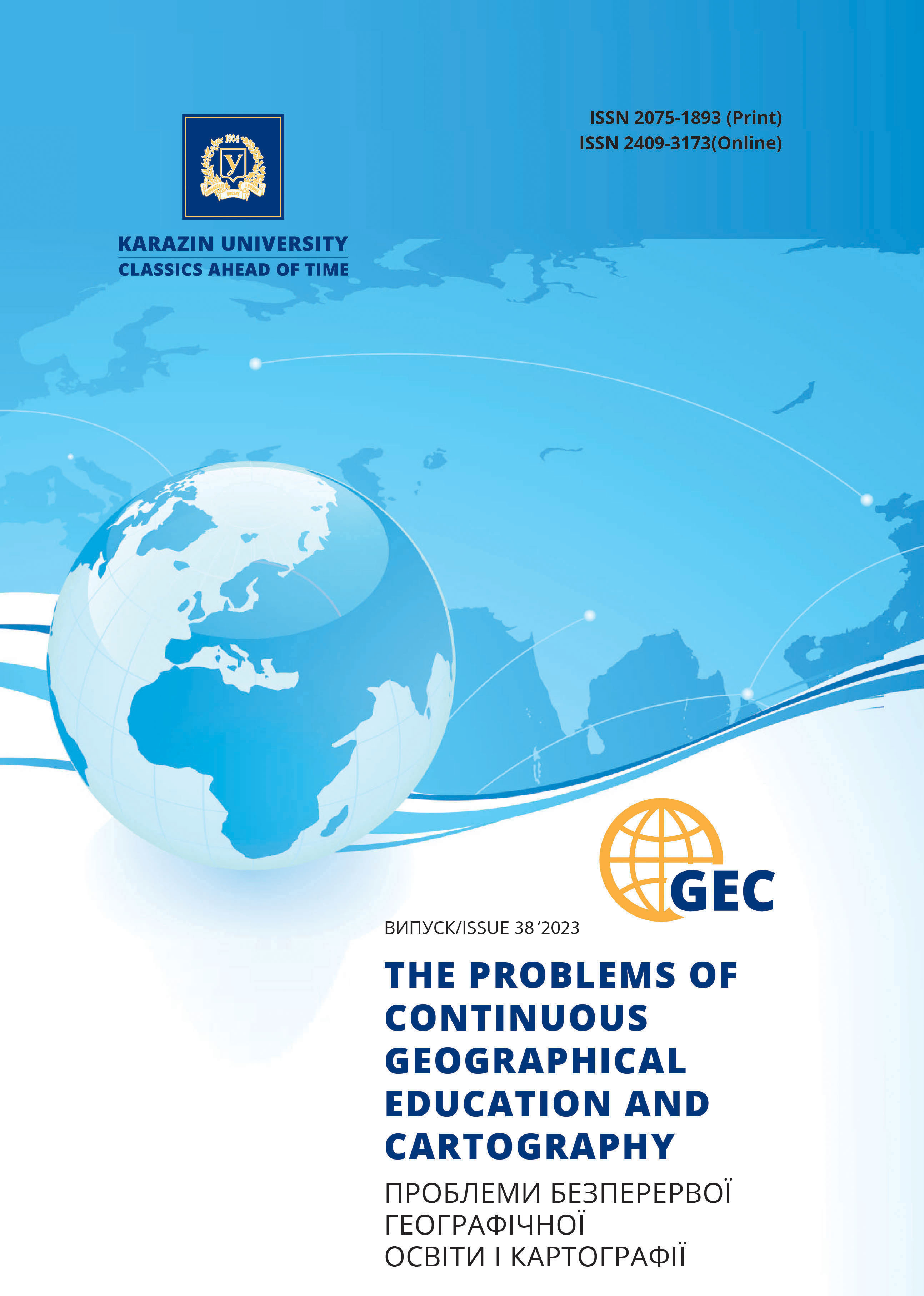Philosophical approach in geographical research
Abstract
The purpose of the paper is to justify the importance of the philosophical approach in geographical research, to show the role of philosophy in historical development, the contemporary evolution of science, formation of the general scientific picture of the world, highlighting the evolution of ideas and approaches in the field of the research of the system “human - nature - society”
The main material. From the philosophical point of view, the change in the scientific picture of the world at a certain historical stage of human evolution occurs together with the formation of the new scientific paradigm of Laplacian determinism, typical for this period. A characteristic paradigm for classical science is mechanics. Scientific ideas and principles relied on their relevant laws. The mechanistic picture of the world uses the principles of rigid determinism, we see the image of the universe as a clockwork mechanism. From a philosophical point of view, determinism is a doctrine of the general conditioning of natural phenomena. Its practical significance is the following: knowing the previous state of natural systems, for example, makes it possible to predict their further change. In the non-classical picture of the world, the prevailing paradigm is relativity, discreteness, probability, and additionality. In post-non-classical science, the dominant paradigm is the paradigm of formation and self-organization based on laws, principles, and ideas of synergy. In the methodology of certain branch areas, we can interpret the concept of paradigm differently, in contrast to what we use here, depending on the specifics of the subject-object field of research. When scientific stages change, the achievements of the previous ones do not disappear but continue to exist with additions and improvements. It corresponds from a philosophical point of view to the principle of global evolutionism. The separation of geography from natural science and its formation as an important science in learning the patterns of interaction between nature and society began long ago. The role of philosophy, particularly ancient philosophers, in this process is quite noticeable and essential. Issues of the system organization, phenomena, and processes in the world deserve special attention. It is impossible to solve the global problems of humanity in a single global social and geographical system without them. Human geography studies the system “human-nature-society” comprehensively and interdisciplinary, considering the principles of the system and synergistic approaches.
Conclusions. The use of a philosophical approach and philosophical methods in socio-geographical research is connected with the evolution and development of scientific knowledge built on the main principles of modern science, in particular: global evolutionism, systematicity, historicism, synergism.
In the modern world, there is a close connection between various sciences, particularly in the field of research, and the system of “human - nature - society,” including between philosophy and geography. It ensures the unity of sciences in the study of complex interaction issues between the society and the planet and the need to solve the global problems of humanity.
Downloads
References
Caseyб, E.S (2001) Between Geography and Philosophy: What Does It Mean to Be in the Place-World? Available as: https://www.jstor.org/stable/3651229 [in English].
Puente-Lozano, P. (2023) History and philosophy of geography I: Heterodox progress, critical scepticism, and intellectual voluminosity Available at: https://www.researchgate.net/publication/369542015_History_and_philosophy_of_geography_I_Heterodox_progress_critical_scepticism_and_intellectual_voluminosity [in English].
Tambassi, T., Tanca, M. (2021). The Philosophy of Geography. Available at: https://link.springer.com/book/10.1007/978-3-030-77155-3 [in English].
Varzi, A.C. (2001) The Philosophy of Geography. Available at: https://www.academia.edu/8640881/The_Philosophy_of_Geography [in English].
Zavhorodko, L. (2013) Osvitni vymiry filosofii heohrafii [Educational dimensions of the philosophy of geography] / Science and Education a New Dimension. Humanities and Social Science, I(2), Issue: 12 Available at: https://seanewdim.com/wp-content/uploads/2021/02/Zavhorodko-L.V.-Educational-dimensions-of-the-philosophy-of-geography.pdf [in Ukrainian].
Lipych, L.H., ed. (2018). Methodology and organization of scientific research: tutorial. Lutsk: Vezha, 220 [in Ukrainian].
Mezentsev, K.V. (2005). Human-geographic forecasting of regional development: monograph. Kyiv: KNU, 253 [in Ukrainian].
Nadybska, O. Ya. (2009). Philosophy: tutorial. Odesa: OLI, 360 [in Ukrainian].
Niemets, K.A., Niemets, L.M. (2014). Theory and ethodology of geographic science: methods of spatial analysis: tutorial. Kharkiv: KhNU, 172 [in Ukrainian].
Pistun, M.D. Basics of the theory of social geography (1996). Kyiv: Vyshcha shkola, 231 [in Ukrainian].
Serhiienko, V.V. (2011). Philosophical problems of scientific knowledge: tutorial. Kremenchuk: KremNU, 103 [in Ukrainian].
Topchiiev, O.H. (2009). Basics of human geography: tutorial. Odesa: Astroprint, 544 [in Ukrainian].
Topchiiev, O.H. (2016) The subject area of geography and its modern methodological transformations. Ukrainskyi Geohrafichnyi Zhurnal. Available at: http://nbuv.gov.ua/UJRN/UGJ_2016_1_13 [in Ukrainian].
Fedii, O. (2016). Philosophical approaches to understanding the category “environment”. Filosofski obrii. Available at: https://core.ac.uk/download/pdf/144772302.pdf [in Ukrainian].
Shablii, O.I. (2003). Basics of general human geography: tutorial. Lviv: LNU, 444 [in Ukrainian].

This work is licensed under a Creative Commons Attribution 4.0 International License.





